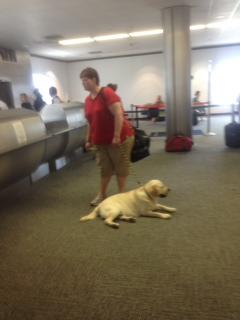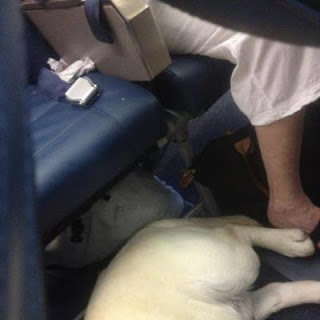Lions and Tigers and Bears, Oh MY!
On Saturday, at Miami airport, I was waiting near the gate for my Delta flight to JFK.
There was a woman with her big yellow lab, and I overheard her telling the gate agent that she needed to have the dog on the plane with her for emotional support. We were all kind of baffled because she appeared to have full sight and there seemed to be “nothing” obviously physically or otherwise wrong with this woman. Simply stated, and maybe it is unthoughtful of me to feel this way, but my first instinct was that she was trying to pull a quickie, to get away with something that she wasn’t entitled to do.
 |
| Lady with dog at airport |
We boarded the plane.
I was lucky to be upgraded to first class, sitting in, I believe row 4 of the aircraft. The woman and her dog were right behind me, in the first row of coach. The row was considered bulkhead, though there was only a curtain rather than a partition in front of her. Though it fidgeted quite a bit, the dog sat quietly in front of her – i.e., directly behind me and/or under my seat. I sneezed a lot and I faintly smelled the dog, and heard her whimsically talking to her pooch much of the flight.
 |
| Immediately behind my seat |
I checked the Delta website and found an entire section on traveling with pets. One section dealt with pets as “carry on,” another with pets as “cargo” and another with “shipping” pets. The Carry On provisions state the following:
At Delta, we take the time and care to ensure every animal travels safely and comfortably with our Delta Pet First™ service. There are several different options available to get your pet to its final destination, including being brought into the cabin with you, checked as baggage, or being shipped.
Rest assured that your pet will be treated with the same comfort and care you have come to expect from us.Government Regulations
Some states may require a health certificate for your pet. Your veterinarian, the U.S. Department of Agriculture, or the Department of Agriculture of the state you are traveling to may provide you with more information.
Pets As Carry On
For tickets issued on or after February 14, 2012, pets in cabin will not be permitted in Business Elite/Business Class on any international flight.
For tickets issued prior to February 14, 2012, pets in cabin will not be permitted in BusinessElite/Business Class on the following aircraft types:
- A330
- 757-200ER
- 757-300ER
- 767-400
- 777-200
Some pets can travel with you in the cabin for a one-way fee of 125 USD/CAD (to be collected at check-in) for travel within U.S./Canada, U.S. Virgin Islands, and Puerto Rico (200 USD/CAD/EUR* for travel outside the U.S.) with the exception of any travel to/from Brazil in the coach cabin only which is 75 USD each way. For any travel to/from South Africa (in exception of service animals) pets must travel as cargo and are not permitted in the cabin or as checked baggage.
Pets permitted in the cabin include dogs, cats (domestic and international), and household birds (domestic US only). The following restrictions apply:
- Your pet must be small enough to fit comfortably in a kennel and under the seat directly in front of you. Maximum carry-on kennel dimensions are determined by your flight. You must contact Delta Reservations to determine the appropriate kennel size.
- Your pet must remain inside the kennel (with door secured) while in a Delta boarding area (during boarding and deplaning), a Delta airport lounge, and while onboard the aircraft.
- Your pet must be at least 8 weeks old for Domestic travel and 15 weeks old for International travel.
- You may not carry on more than one pet.*
- Your pet in-cabin counts as one piece of carry-on baggage.
- If you’re traveling to Hawaii, your pet won’t be able to go with you in the cabin, and other restrictions may apply. See Pets to Hawaii for more information.
- Pets are prohibited in-cabin and as checked baggage into Hong Kong, the U.A.E., South Africa and the United Kingdom. Pets may only be brought into HKG and the UK as cargo.
- CAD amount will be charged exit Canada, and EUR amount will be charged exit Europe. Fees established by the contract of carriage in effect at the time of ticket issuance will apply.
Also, Delta limits the number of pets per flight, but only one per passenger, to:
Class Number of Pets Allowed First Class 2 BusinessElite® (within U.S. / Canada) 2 International BusinessElite 0 Main Cabin 4 Pets are accepted on a first-come, first-serve basis. Call Delta in advance at 800-221-1212 to arrange to bring your pet on board.
*Exception: Two pets of the same type and 8 weeks (15 weeks for international travel) to 6 months of age may be allowed in one kennel, for example two dogs or two cats. They must be small enough to fit in one kennel provided they are compatible and must be of the same species and size, and they must meet the requirements of acceptance. They will be charged as one pet.
But none of this applies, when the animal is denominated a “Service Animal.” The rules then are entirely different.
I found the section of the Delta Website dedicated to “Special Travel Needs“, and it is within that section, I found the topic entitled “Service Animals” and yet another topic entitled “Emotional Support Animals and Psychiatric Service Animals.” That guideline states:
Emotional Support Animals and Psychiatric Service Animals
Delta complies with the Air Carrier Access Act by allowing customers traveling with emotional support animals or psychiatric service animals to travel without charge with the following conditions:
Acceptance Guidelines
- May or may not be trained to perform observable functions. However, the animal must be trained to behave properly in public settings as service animals do.
- Emotional support animals travel free of charge and the animal is exempt from cabin allotment.
- Like service animals, emotional support animals can be transported in the cabin.
- Delta requires documentation (not more than one year old) on letterhead from a licensed mental health professional to be presented to an agent upon check in stating:
- Title, address, and phone number of mental health professional.
- The passenger has a mental health related disability recognized in the Diagnostic and Statistical Manual – 4th Edition.
- That the passenger needs the emotional support or psychiatric service animal as an accommodation for air travel and/or for activity at the passenger’s destination.
- That the person listed in the letter is under the care of the assessing physician or mental health professional.
- A kennel is not required for emotional support animals if they are fully trained and meet same requirements as a service animal.
- Passengers should ask to speak to the Complaint Resolution Office (CRO) if they encounter any issues while traveling with emotional support animals.
Note: Passengers intending to travel with emotional support animals into England need to arrange PRE-APRROVAL CLEARANCE and pay a fee for processing. For London-Heathrow (LHR) you must contact Customs Animal Reception Centre on +44 208 745 7895, or +44 208 759 7002. For London-Gatwick (LGW) the Customs Animal Reception Centre contact number is 0044 1293 555580. For Manchester (MAN) processing is handled by Pets on Jets and the contact number is 44 161 209 7670.
So, apparently, as long as the passenger followed the above guidelines, it was entirely within her rights to bring her dog on the plane with her. OK, I understand the rule now, but see lots of potential for those who want to take advantage of the rule, to do so.
Still others, as a woman I know who doesn’t appear ill, but who in fact must carry medical equipment for a very serious medical condition, stood up in defense of persons such as the dog lady on the MIA-JFK flight. This woman told me of the ongoing saga of difficulties she has faced in educating airline personnel of her right to carry this medical equipment – and without it counting as an allotted carry on. I have invited her to write a post about this topic and her experiences on this blog.
Getting back to emotional support animals, I came across this article in CNS NEWS, entitled Feds: Airlines Must Let Passengers Fly with Pigs for Emotional Support. It addresses the Department of Transportation’s (DOT) draft manual on equity for the disabled in air travel. So, its not just dogs: its travel with pigs and horses and a whole variety of animals that is protected!
The article, written by Elizabeth Harrington, states:
(CNSNews.com) – Pot-bellied pigs must be granted passage on airplanes if they are used for “emotional support” by their owners, states the Department of Transportation’s (DOT) draft manual on equity for the disabled in air travel.
The DOT published its “Nondiscrimination on the Basis of Disability in Air Travel: Draft Technical Assistance Manual” in the Federal Register on July 5, providing guidance that allows swine on airplanes if they are determined to be service animals.
The manual is designed to “help carriers and indirect carriers and their employees/contractors that provide services or facilities to passengers with disabilities, assist those passengers in accordance with” the Air Carrier Access Act. The manual open for public comments until Oct. 3.
Under the “Service Animal” section, the department lays out a scenario for airline carriers entitled “Example 1.”
The manual states: “A passenger arrives at the gate accompanied by a pot-bellied pig. She claims that the pot-bellied pig is her service animal. What should you do?”
“Generally, you must permit a passenger with a disability to be accompanied by a service animal,” reads the manual. “However, if you have a reasonable basis for questioning whether the animal is a service animal, you may ask for some verification.”
The manual instructs airline carriers and their employees to begin by asking questions about the animal, such as, “What tasks or functions does your animal perform for you?” or “What has its training been?”
“If you are not satisfied with the credibility of the answers to these questions or if the service animal is an emotional support or psychiatric service animal, you may request further verification,” the guidebook states. “You should also call a CRO [Complaints Resolution Official] if there is any further doubt as to whether the pot-bellied pig is the passenger’s service animal.”
If the answers are satisfactory, pot-bellied pigs, which can weigh as much as 300 pounds, must be accepted aboard the plane.
“Finally, if you determine that the pot-bellied pig is a service animal, you must permit the service animal to accompany the passenger to her seat provided the animal does not obstruct the aisle or present any safety issues and the animal is behaving appropriately in a public setting,” the manual states.
Last November, ABC News reported that a 300-pound pot-bellied pig flew on a US Airways flight from Philadelphia to Seattle because the animal was deemed a therapeutic companion pet.Wendy Ponzo, vice president of the North American Potbellied Pig Association, said that the pigs can be used as service animals and can be trained to open and close doors and use a litter box. “They also seem to have a sense if the owner is not feeling well to stay by them,” said Ponzo, who has multiple sclerosis.
“They help me a great deal when I feel at my worst,” she said.
The DOT’s technical assistance manual is designed for airlines and passengers with disabilities under the Air Carrier Access Act (ACAA). The ACAA was passed in 1986 and bars discrimination against the disabled in air travel.
“It is designed to serve as an authoritative source of information about the services, facilities, and accommodations required by the ACAA,” the manual states. The DOT says that the manual “does not expand carriers’ legal obligations or establish new requirements under the law.”
In its definition of service animal, the DOT includes creatures that provide “emotional support.” The manual defines a service animal as an “animal individually trained to perform functions to assist a person with a disability; Animal that has been shown to have the innate ability to assist a person with a disability…or Emotional support or psychiatric service animal.”
“You should be aware that there are many different types of service animals that perform a range of tasks for individuals with a disability,” the manual states.
“Be aware,” it says, “that people who have disabilities that are not apparent may travel with emotional support, psychiatric service, or other service animals,” it says.
Though pot-bellied pigs are permissible, the DOT forbids some animals from aircraft. “As a U.S. carrier, you are not required to carry certain unusual service animals in the aircraft cabin such as ferrets, rodents, spiders, snakes and other reptiles,” it states.
Miniature horses and monkeys, which the manual describes as “commonly used service animals,” are also permitted.
On a case-by-case basis, the DOT says, animals can be turned away if they are “too large or heavy to be accommodated in the aircraft cabin; would pose a direct threat to the health and safety of others; would cause a significant disruption in cabin service; or would be prohibited from entering a foreign country at the aircraft’s destination.”
As CNSNews.com previously reported, under new Americans with Disabilities Act guidelines businesses also must permit miniature horses for use as service guide animals on their premises.
According to the DOT guidebook, if an animal is not accepted, the carrier must document the decision in writing and provide it to the passenger within 10 days.
Foreign carriers only have to accommodate dogs as service animals, unless the flight is code-shared with a U.S. carrier.
Carriers must also provide “relief areas” for service animals. “With respect to terminal facilities you own, lease, or control at a U.S. airport, you must, in cooperation with the airport operator, provide relief areas for service animals that accompany passengers with a disability who are departing, arriving, or connecting at an airport on your flights,” the manual states.
The Transportation Security Administration (TSA) of the Department of Homeland Security prohibits many items from being carried onto airplanes, including sporting goods, liquids over 3 ounces, and snow globes. The TSA has faced criticism after several incidents involving its treatment of the mentally disabled.
In June 2011, for example, at Detroit’s McNamera Terminal, the TSA confiscated a 6-inch plastic toy hammer from Drew Mandy, a severely mentally handicapped man who carried the toy for security. Mandy, who is 29-years old but has the mental capacity of a 2-year-old, was subject to a thorough pat down by TSA agents, who then threw away the toy after they considered it to be a weapon.
Lions and Tigers and Bears (but no snakes or mice), OH MY! Can I bring my giraffe?
What are your thoughts or experiences on this?
Please note: Will Run For Miles may have a financial relationship with some of the merchants advertised on the blog, and may receive minimal compensation if consumers utilize the links located on this site and generate sales therefrom.


 A New York frequent flyer who elegantly combines her passions for worldwide travel, running a gazillion marathons all over the globe and staying fit ... without sacrificing her fancy for good wine and food.
A New York frequent flyer who elegantly combines her passions for worldwide travel, running a gazillion marathons all over the globe and staying fit ... without sacrificing her fancy for good wine and food.
Nice post! Txs – Rene
A good, comprehensive post, for certain. My thoughts:
1. In a few, legitimate cases, “Emotional Support” animals are appropriate and even essential. (If it keeps the human pax calm,it is probably worth the inconvenience.)
2. Strictly from personal observation, this just has to be the most commonly abused ‘disability’ accommodation in the travel business. The numbers of abusing pax are huge and their motivations a varied as their reasons for flying. How does it happen? Medical and Mental Health professional practice their professions to make a PROFIT. Keeping their clients happy and accommodating their wishes, legitimae and otherwise is part of what they do.
3. When confronted with a current Letter of Authorization, the check-in and gate agents have little choice but to comply and to allow the animal aboard. The airlines and their other clients are the ones getting screwed. And in th e majority of cases (that I’ve seen) the true motivation is simply to avoid the rather high cost of shipping the animal via the more traditional route. Rules gone amuck, obviously.
Emotional support animals have been flying for close to a decade, that I am aware of, maybe longer. If you don’t like the rule, I suggest blogging about it will only cause more people to take advantage.
I have never seen an emotional support animal cause a problem on a flight. I have seen many passengers that did not know how to behave on a flight.
You can’t judge someone’s mental health , by looking at them.
Did you really take a picture of this ladies face, and blog personal information that she intended to share with an airline employee, about her mental health. That was wrong of you.
Thank you so much for sharing your views.
As for the woman, perhaps it wasn’t clear in the post, but she was overtly announcing to passengers that she was traveling with her pup on “emotional support” grounds. Based on these facts, your inference that posting her photo might have somehow been insensitive to her privacy, is unfounded.
What if it distresses me emotionally to be in a small confined area with a certain type of animal (whether pig or whatever else someone claims they need). How do we determine whose needs are most important? Whoever heard of this 10-15 years ago? I would say more but most likely would accused of not being PC.
I want to say “Only in the USA”, but fear someone will go on about the rights we have as Americans (which I already know and am thankful for), or they’ll come up with an example of a country where goats or sheep can bump passengers from seats…
Service animals and emotional support animals can come in many sizes and species. In fact emotional support animals are usually lapdogs by nature and smaller than most service dogs. They usually are for victims of Post Traumatic Stress Syndrome or seizure warning dogs. I’ve been on many flights where they were present and in fact make the experience much more pleasant.
People with some political ax to grind should not intentionally make fun of the valid need by trying to board large disruptive animals. That is just a childish stunt to make fun of service and support animals. And airlines have the right, on a case-by-case basis, to refuse such disruptive service or support animals.
I’m more concerned that while airlines and rental apartments have to provide for such legitimate assistance animals, hotels do not.
Your comment that the woman looked fine and not sick is very ignorant. First of all, this is an Emotional Support Animal…for emotional issues and needs…it has nothing to do with how the woman looks. Even people with Service animals may not look sick. There are a lot of people that appear to be healthy but they are in a lot of pain and I am one of those people. Grow up and deal with it and stop being so presumptuous.
Sometimes no matter how one says something, they offend someone. I certainly did not mean to offend you or seem insensitive to your predicament, and I apologize if that’s how you took it.